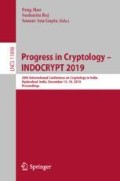Abstract
Arbiter-based Physically Unclonable Functions (Arbiter PUF) were introduced to generate cryptographically secure secret keys during runtime, rather than storing it in Non-Volatile Memory (NVM) which are vulnerable to physical attacks. However, its construction was a target to several statistical and modeling attacks. One such statistical weakness of the Arbiter PUF is that it leaks information to the adversary, if some challenge-response pairs are known. The response is heavily biased towards the effect of flipping certain bits of the input, a widely studied property, known as the Strict Avalanche Criterion (SAC). Several variants of Arbiter PUFs have been proposed since then, with varying degrees of success against SAC. In this paper, we provide a generalized framework to analyze any Arbiter PUF variant against SAC. Building on this analysis, we propose a new Arbiter PUF variant which is not only highly resistant to SAC but also has very good reliability.
Access this chapter
Tax calculation will be finalised at checkout
Purchases are for personal use only
References
Becker, G.T.: The gap between promise and reality: on the insecurity of XOR arbiter PUFs. In: Güneysu, T., Handschuh, H. (eds.) CHES 2015. LNCS, vol. 9293, pp. 535–555. Springer, Heidelberg (2015). https://doi.org/10.1007/978-3-662-48324-4_27
Delvaux, J., Gu, D., Schellekens, D., Verbauwhede, I.: Secure lightweight entity authentication with strong PUFs: mission impossible? In: Batina, L., Robshaw, M. (eds.) CHES 2014. LNCS, vol. 8731, pp. 451–475. Springer, Heidelberg (2014). https://doi.org/10.1007/978-3-662-44709-3_25
Devadas, S.: Physical unclonable functions and secure processors. In: Clavier, C., Gaj, K. (eds.) CHES 2009. LNCS, vol. 5747, p. 65. Springer, Heidelberg (2009). https://doi.org/10.1007/978-3-642-04138-9_5
Gassend, B., Clarke, D., Van Dijk, M., Devadas, S.: Silicon physical random functions. In: Proceedings of the 9th ACM Conference on Computer and Communications Security, pp. 148–160. ACM (2002). https://dl.acm.org/citation.cfm?id=586132
Gu, C., Hanley, N., O’neill, M.: Improved reliability of FPGA-based PUF identification generator design. ACM Trans. Reconfigurable Technol. Syst. 10(3), 20:1–20:23 (2017)
Hammouri, G., Sunar, B.: PUF-HB: a tamper-resilient HB based authentication protocol. In: Bellovin, S.M., Gennaro, R., Keromytis, A., Yung, M. (eds.) ACNS 2008. LNCS, vol. 5037, pp. 346–365. Springer, Heidelberg (2008). https://doi.org/10.1007/978-3-540-68914-0_21
Kömmerling, O., Kuhn, M.G.: Design principles for tamper-resistant smartcard processors. In: Smartcard 99, pp. 9–20 (1999). http://static.usenix.org/events/smartcard99/full_papers/kommerling/kommerling.pdf
Lee, J.W., Lim, D., Gassend, B., Suh, G.E., Van Dijk, M., Devadas, S.: A technique to build a secret key in integrated circuits for identification and authentication applications. In: 2004 Symposium on VLSI Circuits, Digest of Technical Papers (IEEE Cat. No. 04CH37525), pp. 176–179. IEEE (2004). https://people.csail.mit.edu/devadas/pubs/vlsi-symp-puf.pdf
Lim, D., Lee, J.W., Gassend, B., Suh, G.E., Van Dijk, M., Devadas, S.: Extracting secret keys from integrated circuits. IEEE Trans. Very Large Scale Integr. Syst. (VLSI) 13(10), 1200–1205 (2005)
Machida, T., Yamamoto, D., Iwamoto, M., Sakiyama, K.: A new mode of operation for arbiter PUF to improve uniqueness on FPGA. In: 2014 Federated Conference on Computer Science and Information Systems, pp. 871–878. IEEE (2014)
Maiorana, J.A.: A class of bent functions. R41 Technical Paper, August 1970
Maiti, A., Gunreddy, V., Schaumont, P.: A systematic method to evaluate and compare the performance of physical unclonable functions. In: Athanas, P., Pnevmatikatos, D., Sklavos, N. (eds.) Embedded Systems Design with FPGAs, pp. 245–267. Springer, New York (2013). https://doi.org/10.1007/978-1-4614-1362-2_11
Menezes, A.J., van Oorschot, P.C., Vanstone, S.A.: Handbook of Applied Cryptography. CRC Press, Boca Raton (1996). ISBN: 0-8493-8523-7
Nguyen, P.H., Sahoo, D.P., Chakraborty, R.S., Mukhopadhyay, D.: Security analysis of arbiter PUF and its lightweight compositions under predictability test. ACM Trans. Des. Autom. Electron. Syst. (TODAES) 22(2), 20 (2017)
Rührmair, U., Sehnke, F., Sölter, J., Dror, G., Devadas, S., Schmidhuber, J.: Modeling attacks on physical unclonable functions. In: Proceedings of the 17th ACM Conference on Computer and Communications Security, pp. 237–249. ACM (2010). https://eprint.iacr.org/2010/251.pdf
Sahoo, D.P., Mukhopadhyay, D., Chakraborty, R.S., Nguyen, P.H.: A multiplexer-based arbiter PUF composition with enhanced reliability and security. IEEE Trans. Comput. 67(3), 403–417 (2017)
Srinivasu, B., Vikramkumar, P., Chattopadhyay, A., Lam, K.-Y.: CoLPUF: a novel configurable LFSR-based PUF. In: IEEE Asia Pacific Conference on Circuits and Systems (APCCAS), pp. 358–361 (2018)
Meng-Day, Y., Hiller, M., Delvaux, J., Sowell, R., Devadas, S., Verbauwhede, I.: A lockdown technique to prevent machine learning on PUFs for lightweight authentication. IEEE Trans. Multi-scale Comput. Syst. 2(3), 146–159 (2016)
Acknowledgments
We would like to thank the anonymous reviewers of Indocrypt 2019 for their valuable suggestions and comments, which considerably improved the quality of our paper.
Author information
Authors and Affiliations
Corresponding author
Editor information
Editors and Affiliations
Rights and permissions
Copyright information
© 2019 Springer Nature Switzerland AG
About this paper
Cite this paper
Siddhanti, A.A., Bodapati, S., Chattopadhyay, A., Maitra, S., Roy, D., Stănică, P. (2019). Analysis of the Strict Avalanche Criterion in Variants of Arbiter-Based Physically Unclonable Functions. In: Hao, F., Ruj, S., Sen Gupta, S. (eds) Progress in Cryptology – INDOCRYPT 2019. INDOCRYPT 2019. Lecture Notes in Computer Science(), vol 11898. Springer, Cham. https://doi.org/10.1007/978-3-030-35423-7_28
Download citation
DOI: https://doi.org/10.1007/978-3-030-35423-7_28
Published:
Publisher Name: Springer, Cham
Print ISBN: 978-3-030-35422-0
Online ISBN: 978-3-030-35423-7
eBook Packages: Computer ScienceComputer Science (R0)

